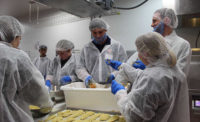Chef Mike Erickson talks with Sam Gazdziak about how the TRUE BEEF documentary came about and how it is a great educational tool.
Sam Gazdziak: We are here with Chef Mike Erickson, who is behind the TRUE BEEF documentary. Chef, can you tell us a bit about how this whole experience started?
Mike Erickson: The TRUE BEEF started with a trip with 27 other chefs to Kansas on a Pasture to Plate Tour, and I got to visit the Cargill Innovations Center. I really drove all over Kansas learning about cattle production, pasture to plate, and I thought, “This would be an awesome experience for young people at the high school level back in my home state of Texas to be able to do something similar.” It progressed from a field trip into a full-blown documentary film that we produced, and we are now sharing with other educators and young people.
Gazdziak: With your experience working with the high school students, what were some of the perceptions they had about the meat industry that maybe came from a slanted view from other films and documentaries?
Erickson: Part of the TRUE BEEF process was getting the students to analyze and research the meat industry. There was a lot of pre-conceived notions from different media sources and research that they did that cattle are pumped full of hormones or that they are only fed grain and not any grass. A lot of stereotypes that they were able to debunk and learn first-hand from a lot of the experts we worked with going out to ranches and farms and processing facilities and seeing the technology and the facilities and the people that are actually doing this to produce the beef. It really opened their eyes to a lot of things they thought they knew were actually the opposite.
Gazdziak: One of the challenges the industry has been having is reaching out to consumers, because people who are activists are against the meat industry have cornered that market and the meat industry has a bit of an uphill battle to get their perspective out there. From your experience, how do you think the meat industry should start to move forward and communicate, especially with the younger consumers and the up-and-coming consumers?
Erickson: I think the meat industry is doing a good job, but I think it is really important for them to focus on education. Whether they are going to be future consumers or not, they are still going to make buying decisions when they grow up. They are going to go out and shop in a grocery store or eat at a restaurant, and if they don’t have first-hand information about the product, in today’s age when you have social media and the Internet, they can pretty much find out whatever they want to find out. Hopefully, the meat industry can put out good information and resources to get it to them at the high school level, so they can be exposed to it early on versus reading about it or hearing about it from a friend and then finding out their information is completely wrong. I think the meat industry can produce some content and some educational material that they could use in the classroom to get their message out there about what they do and what they have been doing for years. It’s just that social media has changed things a bit and the way people get information.
Gazdziak: For people who are interested in getting more information about the film, what’s the best way to go about that?
Erickson: If you are interested in finding out more about the TRUE BEEF project or getting a copy of the DVD, you should contact Russell Woodyard at the Texas Beef Council, and he can get you a copy or more information. We also have a website http://www.truebeefthefilm.com/home.html and a Facebook page <https://www.facebook.com/TrueBeeftheFilm>, which we would love for you to support for the kids and to promote a positive image about meat and the beef industry.





